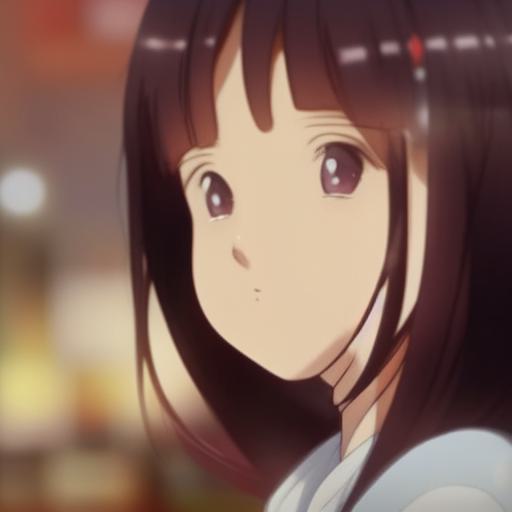How to write this prompt?
Here is a breakdown of the prompt and how each individual part influences the image being generated:
- Mesmerizing anime portrait from Studio Ghibli: This sets the style and tone for the image, letting the AI know that it should be an anime-style portrait similar to the works of Studio Ghibli.
- School girl in a close-up shot: This provides a clear description of the main subject and framing of the image, emphasizing that it should be a close-up shot of a school girl.
- Captured in an octane render: This provides a technical detail for how the image should be rendered, suggesting the use of a specific rendering software called Octane.
- The camera zooms in on the girl’s face: This further emphasizes the framing of the image and the focus on the girl’s face.
- Captured in the middle of a bustling street in Tokyo, with towering buildings and flashing neon lights in the background: This sets the scene and location of the image, suggesting a busy street in Tokyo with tall buildings and neon lights.
- Highly detailed rendering of the girl’s hair and clothing: This suggests that the AI should pay attention to detail and texture when rendering the girl’s hair and clothing.
- Bokeh effect adds depth and beauty: This provides a specific visual effect to enhance the image and create depth.
- The color of the school girl’s uniform has been changed to magenta: This provides a specific color instruction, suggesting a bold and edgy look for the girl.
In summary, to write a prompt like this, it’s important to provide clear and specific instructions for the style, subject, framing, scene, technical details, and visual effects. Each individual part influences the image being generated and contributes to the overall look and feel of the final product.
What is the meaning of “bokeh” in photography?
Bokeh refers to the aesthetic quality of the blur produced in the out-of-focus parts of an image, usually in the background. It is often used in photography to create a shallow depth of field and draw attention to the main subject.
How to create a realistic rendering of hair in a digital image?
To create a realistic rendering of hair in a digital image, it is important to pay attention to detail and texture. The use of 3D modeling software and advanced rendering techniques can help achieve a more realistic look. The artist can also add individual strands of hair and adjust lighting and shadows to create a more natural appearance.
Who is Hayao Miyazaki and what is his contribution to anime?
Hayao Miyazaki is a renowned Japanese animator, filmmaker, and co-founder of Studio Ghibli. He is known for his imaginative and artistic approach to storytelling and has contributed to the development of anime as an art form. Some of his notable works include “My Neighbor Totoro”, “Spirited Away”, and “Princess Mononoke”.
Do I need to have technical knowledge or programming skills to use AI art generation prompts?
No, you do not need technical knowledge or programming skills to use AI art generation prompts. Many AI art generation tools and platforms are designed to be user-friendly and accessible to people with little to no technical background. These tools often provide pre-built templates and prompts that users can easily customize to generate their desired art.
However, some knowledge of image processing, graphic design principles, and art aesthetics can be helpful in creating effective prompts and refining the output of the AI-generated art. Additionally, some tools may offer more advanced features that require some technical skills to use, such as custom coding or integration with other software.
Are there any copyright issues with using AI-generated art?
The use of AI-generated art raises some copyright issues that need to be addressed. Since AI-generated art is created by an algorithm, it can be difficult to determine who owns the copyright to the work. In some cases, the copyright may belong to the person or organization that created the AI model used to generate the art, while in other cases, it may belong to the user who provided the input and customized the output of the model.
Furthermore, the use of pre-existing images or copyrighted material as input for AI art generation can raise issues of fair use and infringement. It is important to ensure that you have the proper permissions and licenses to use any copyrighted material in your AI-generated art.
To avoid copyright issues, it is recommended to use only original content or licensed materials, provide proper attribution when necessary, and consult legal counsel when in doubt about copyright ownership or usage rights.
Visual Paradigm Online is a powerful design tool that enables users to seamlessly integrate AI-generated art into their graphic designs, resulting in visually stunning and engaging graphics with just a few clicks. With its user-friendly interface and an extensive collection of design templates and assets, Visual Paradigm Online offers a convenient and effortless way to experiment with various styles and layouts until you achieve the perfect combination for your project.


